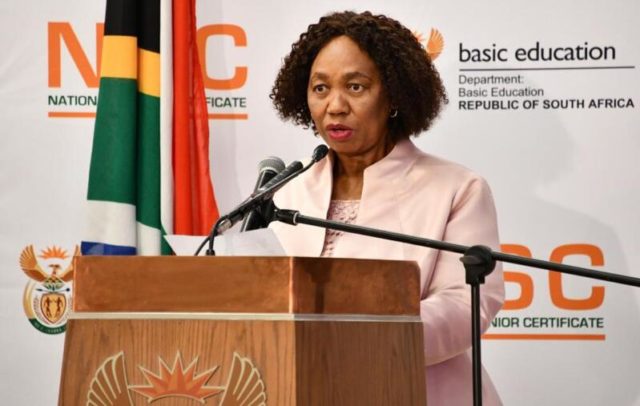The overall pass rate including the progressed learners is at 76.2% a drop of 5.1%.
Cape Town – The 2020 matric pass rate has dropped to 76.2% from 81.3% the previous year.
Motshekga made the announcement during the release of the matric results on Monday.
“The overall pass rate including the progressed learners is at 76.2% a drop of 5.1%. I am grateful to all of South Africa. I was expecting a bloodbath. I am grateful to all teachers we tried all in our powers to claw back time but we can’t,” she said.
She said if the progressed pupils were not included the pass rate would be 81.2%.
From the 2020 cohort, 2 161 pupils with special needs sat for the exam and 2 058 of those passed with admission to a Bachelors Certificate. While 86.3% of the 133 inmates who wrote exams passed – 71 passed with bachelors certificate.
Motshekga said more girls passed then boys and more girls achieved bachelor pass than boys.
Matric pass rate per province:
Free State – 85.1%
Gauteng – 83.3%
Western Cape – 79.9%
KwaZulu Natal – 77.6%
North West – 76.2%
Mpumalanga – 73.7%
Limpopo – 68.2%
Eastern Cape – 68.1%
Northern Cape – 66.%
The Class of 2020 is the seventh group of grade 12s to write their exams under the Curriculum and Assessment Policy Statement (CAPS) system. It is also one of the most unique groups of matrics that finish the year amid tumultuous times, such as the global coronavirus pandemic.
Earlier on Monday, the DBE’s director-general Mathanzima Mweli held a briefing giving a technical report.
More than a million NSC candidates wrote their final exams which commenced on November 5 and concluded on December 17.
According to Mweli this was the first time that one million matric candidates wrote the final examinations and of the million was 607 226 were full-time NSC candidates and 117 808 part-time candidates.
He said November 5 and concluded on December 17.
Despite, learning amid the pandemic Mweli said they outperformed 2019 matric in most subjects, home languages above 40 % and distinction passes.
Mweli, who admitted he was speaking unofficially, said 440 702 passed matric.
Matrics of 2020 were robbed of vital face-to-face attendance for almost four months due to the national lockdown but they lost out on extra-learning opportunities, such as study groups sessions, after school classes and access to the library.
Dr Rufus Poliah, Chief Director for National Assessment and Public Examinations said: “South Africa is part of 22 countries in the world that maintained examinations during the pandemic and stands out as a country that took the bull by the horns.”
Apart from the pandemic, the NSC 2020 exams were also riddled with obstacles such as the leak of two exam question papers; the mathematics paper two and the physical sciences paper 2. The leaked papers circulated on social media prior to the commencement of the exam which led to the first national rewrite in history. An investigation by the Hawks and the DBE task team implicated 893 NSC candidates.
However; last week, Umalusi, the Quality Council for General and Further Education and Training, validate the credibility of the NSC examinations giving the DBE the greenlight to release the results.
“The executive committee of the council approves the release of the November NSC examinations based on evidence that the exam was conducted in accordance with the examination policies and regulations, irrespective of the generally identified irregularities,” said Council Chairperson, Professor John Volmink.
The council further ordered that the results of the 893 candidates be blocked until the investigation is concluded.
Meanwhile, the Independent Examinations Board (IEB) recorded a minor decline of 98.07% in its matric pass rate, compared the previous year’s pass rate.
According to the IEB NSC results released on Friday, 88.42%, compared to 89.51% in 2019, of the cohort achieved entry to study towards a degree qualification. About 8.14% of the candidates, compared to 7.91%, in 2019 qualify towards a diploma, while 1.51%, compared to 1.4% in 2019, qualify to study towards a higher certificate level.
Anne Oberholzer, CEO of the IEB, said: “The excellent performance of the class of 2020 under very difficult circumstances underscores the importance of the years of good, solid teaching and learning prior to the grade 12 year.”








